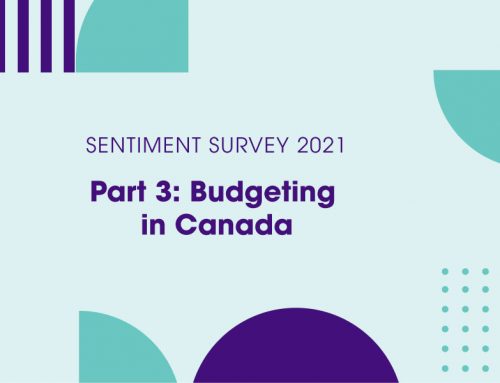Many Canadians find budgeting intimidating. We recently conducted a Personal Finance Sentiment Survey and discovered that 52% of respondents do not have a budget. In addition, 72% of respondents said they know how to budget. But if so many Canadians know how to budget, why are they not budgeting to improve their bottom line?
Maybe you have started a budget in the past and failed to keep it up for a number of reasons. But don’t knock it until you have tried it. A budget is your escape from debt, a poor credit score and a restrictive financial future. Unfortunately, there are many myths around budgeting that stop people from creating one in the first place. But here us out! Let’s learn about these five budgeting myths that you should ignore to help improve your financial fitness.
Myth 1 – You can’t include money for fun in your budget.
When beginning a budget, we often feel as if we have to sacrifice everything we enjoy to meet our financial goals. This is not true. Your budget doesn’t have to consist of only rent, electricity, food shopping, debt payments and savings. It should be a careful plan of how you spend your money per month. A perfect example of this type of balance would be using the 50/30/20 budgeting technique.
Many people buy unconsciously, emotionally and too often – these are areas we need to become more conscious of. Most importantly, your budget isn’t about stopping you from spending your money on the things you enjoy, it’s about helping you plan what you buy next. Often, people misconstrue the meaning of a budget which can be discouraging. Your budget can include money for fun activities – just make sure it’s detailed and carefully planned into your budget.
Myth 2 – I should only budget if I want to save money.
While budgeting and saving money go hand in hand, you don’t have to start a budget just to save money. When you are creating a budget, it’s always recommended to save a small portion of your income if possible – even $50 a month. But it shouldn’t be a deal-breaker on whether you start one or not. If you feel you don’t have the money to save, a budget can help you figure out if that’s true or not. Or if you don’t currently know what your financial goals are, a budget may help you realize what they are.
A budget helps you discover where your money is going and allows you to figure out how much income you can safely afford to save. A budget also allows you to become self-aware of your spending habits and helps you put more money towards your loan or debt payments if needed. If you are not budgeting at the moment, consider starting one – having the support of savings and an emergency fund is priceless.
Myth 3 – Budgeting is very time-consuming.
It’s true that when planning your budget at the start of your journey, this may take a few hours of your time. After that, you will find that it is just a case of following your plan, which takes no time at all. In addition, there are ways you can utilize financial technology to help you save time.
The MyMarble platform allows you to track your spending and finances by securely connecting your bank account. This allows you to focus on what way you’re spending your income – whether it’s primarily on fixed expenses, flexible expenses and debt payments.
Myth 4 – I need to be good with numbers to budget effectively.
This is definitely not true. You don’t have to have a Major in accounting or maths to be able to budget effectively. Basically, your budget involves very simple addition and subtraction – which can all be done on a calculator or on your phone. In addition, your budget isn’t all about maths, it’s about being conscious and watching what you are spending your money on. Budgeting is about adding more money to your savings account and subtracting money from your debt – simple.
Myth 5 – Budgeting is boring!
It’s shocking to hear that this is a common reason why many people don’t create a budget. But personally, I think having a large debt load, no savings for vacations, or not being able to treat yourself at the end of the month is even more boring!
Many of us don’t like to feel restricted when it comes to our money, and consequently, this can make us think that budgeting is boring. But it all depends on your outlook. In addition, if you struggle to figure out how to budget, it might feel boring too. If you do the right research and take the right financial education courses such as our MyBudget Maestro course, you might even begin to find budgeting a little fun. As well as learning some priceless budgeting techniques.
Most importantly, once you start seeing your debt accounts become closer to zero, and notice you have more disposable income, budgeting will become more fun.
The Bottom Line
Through utilizing financial technology and financial education courses, and by creating a clear plan, budgeting can be easy, fun and effective.
Budgeting techniques shouldn’t only be used when you’re in tough financial times – it should be a way to prevent financial struggle in the first place. By practising conscious spending and by planning your next purchases, your budget can be easy to follow. You can begin budgeting by reviewing your bank statements, to figure out what you spend your money on in a month. Then, you can calculate your income to discover how much money you need to allocate to your fixed and flexible expenses.
In addition, budgeting can help guarantee that you are making your minimum debt payments and saving a small portion of your income. Remember, a budget allows you to meet financial goals, reduce debt load, plan for vacations or improve your credit score.
Interested in taking your budgeting skills to the next level? Enrol for free today in our Maestro Financial Education Platform.
MyBudget
No Description






